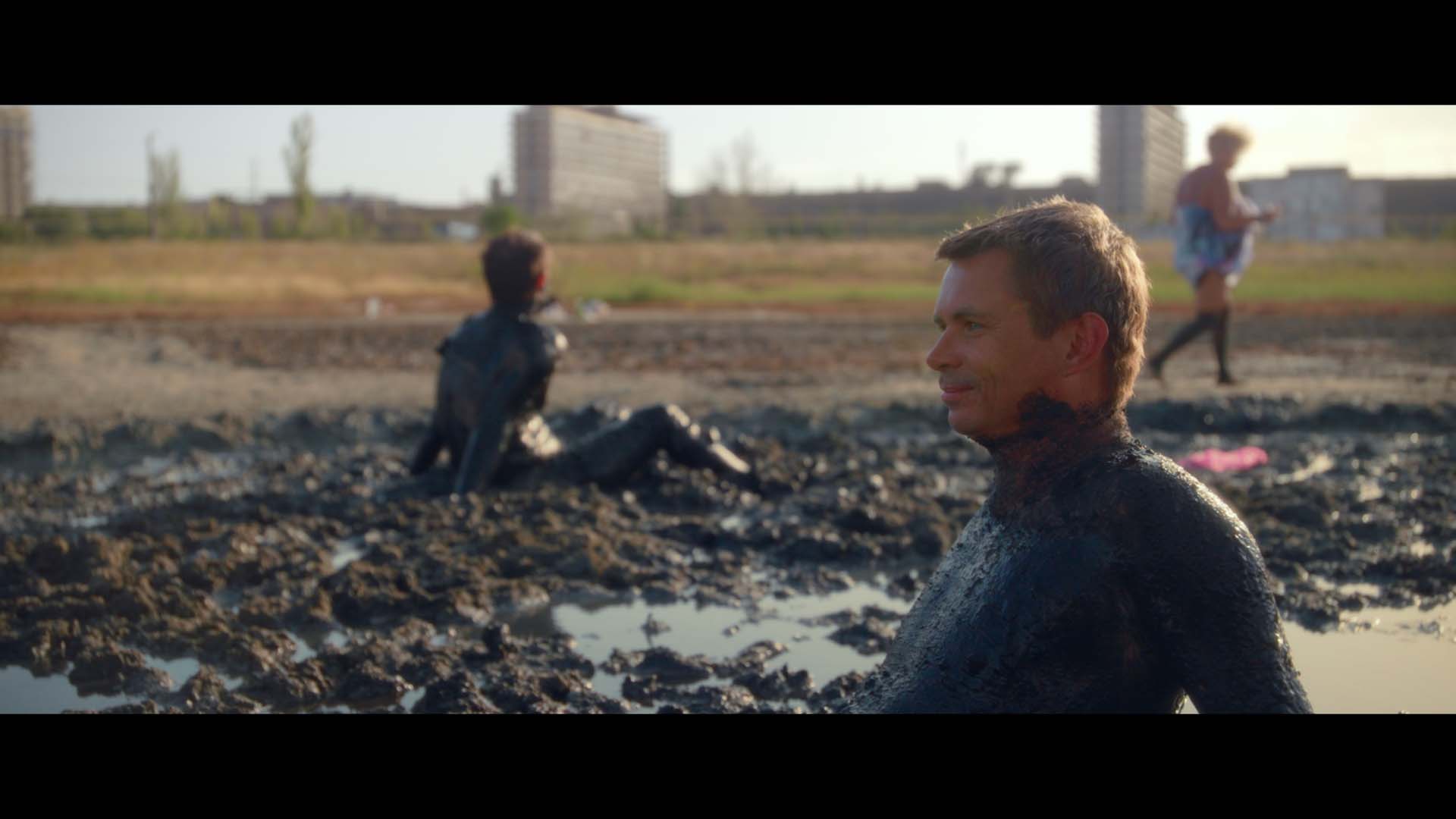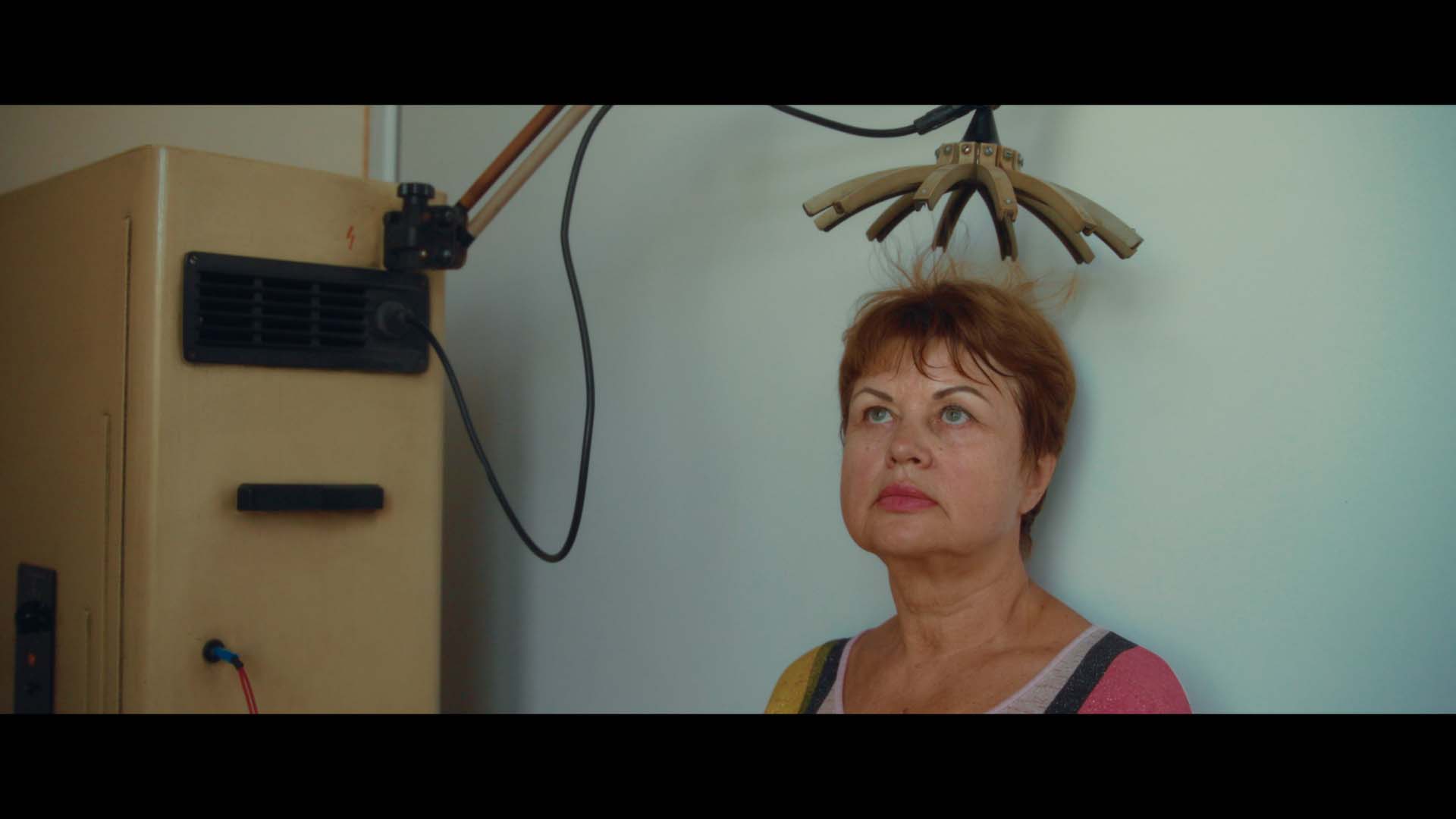- Film And TV
- 09 Sep 25
Sanatorium Director Gar O'Rourke: “I never set out to make a war film. I wanted to make a film about human experiences"

Director Gar O’Rourke discusses his new documentary Sanatorium, which offers a fascinating portrayal of how Ukrainians are coping amid the current conflict with Russia.
When Gar O’Rourke first checked into a Soviet-era sanatorium outside Odesa in the spring of 2021, he was expecting mud baths and electrotherapy, not a revelation.
“I stayed there for over a week, maybe two,” he recalls fondly. “I took all the treatments. I was like, right, sign me up for the mud bath, the hydro bath, the bronchi pool. The whole thing.” What surprised him most was not the eccentric therapies, but the atmosphere. “By the end of that stay, I’d kind of fallen in love with the sanatorium. People were coming away from that place affected in a positive way. There was a kind of invisible magic I wanted to bottle.”
That impulse became Sanatorium, his Ukrainian-language documentary that has now been selected by the Irish Film & Television Academy (IFTA) to represent Ireland in the international feature category at the 2026 Academy Awards. For a Galway-born filmmaker who admits he still cannot quite believe the news, it is both a personal and collective validation.
 Sanatorium
Sanatorium“The ego couldn’t get bigger,” he jokes. “But honestly, it’s amazing. You never know how a film will be received. For Ukrainians to respond positively, and for Ireland to put it forward for the Oscars, you really can’t ask for more as an outsider making a film there.”
The sanatorium itself, the Kuialnyk facility near Odesa, is a relic of the Soviet past, part crumbling resort, part healing retreat, where generations have come for cures that blend medicine, ritual and folklore. Its black mud is said to treat infertility and chronic illness, and O’Rourke was intrigued by it all.
But less than a year after his first visit, Russia’s full-scale invasion changed everything. The sanatorium shut down, reopened months later, and revealed itself to O’Rourke as something else entirely: an oasis of resilience.
“It became a story of ordinary people living in extraordinary times,” he says. “I never set out to make a war film. I wanted to make a film about human experiences. What’s each person looking for? Is it a mother who wants to cure her infertility, a war veteran rehabilitating from trauma, an older man still searching for love? The war is on the periphery, but the focus is on them.”
The sanatorium’s staff – by turns anxious, tender and funny – keep karaoke nights going even when air raid sirens pierce the evening. For O’Rourke, this juxtaposition was irresistible. “It was quirky, it was strange, but also very simple. There was a power in that simplicity, in the collective spirit of the people running it.”
He began to think of the sanatorium as if it were a living being, with its staff as its organs.
“The mind of the sanatorium is the head doctor, Olina,” he says. “The body is the big boy Dimitri, the operations manager, always walking around and shouting. And the heart is Yelena, who runs the karaoke and the chess, who keeps everyone smiling. She has a great line: ‘We’re like stewardesses on an airplane – even when the airplane goes into a dive, we still have to keep smiling.’ That almost encapsulates the essence of the film.”
The film chooses to keep the war offscreen, even though its impacts are deeply felt, and that choice was deliberate. O’Rourke recalls air raids, nights of bombardment and evacuations to basements. But what struck him most was how quickly Ukrainians folded danger into daily life.
“You come out in the morning and people are dropping kids to school, going to work,” he says. “Air sirens go off and friends don’t even break conversation. Humour becomes the coping mechanism. One guy showed me a photo where someone had taped blankets around a siren because they were so sick of hearing it at night. Humour is the ultimate medicine.
It’s something we can relate to in Ireland too. I think of Irish wakes, where humour can cut through grief.”
That sensibility – an instinct for tragicomedy – is embedded in Sanatorium, and the characters O’Rourke introduces the audience to. The retired uranium worker, the war widow, the hopeful mother, the affectionate but bickering mother and son: each carries both sorrow and levity.
O’Rourke likens his casting to assembling a football team, each character embodying a theme, from endurance to longing. Meanwhile, a war veteran provides powerful insights into war as he receives treatment for his injuries, skewering any glamourised portrayals and noting that, “Books are often written by those who didn’t live with war. It’s a dirty, dead and unnecessary business... there’s nothing exciting or romantic about it.”
The stories O’Rourke chose also reflect a striking reality: the gender imbalance of wartime Ukraine.
“There aren’t that many men in the sanatorium,” he says. “Almost all able-bodied men are drafted to war. That means women are keeping the show on the road, holding families together, building support networks for each other. You feel it in the film – the solidarity, but also the loneliness.
“A woman mourning her husband finds solace just by sitting on a bench and talking. Another dreams of becoming a mother, not only for herself, but as a symbol of the future. All of it circles back to hope, and the idea that life must go on.”
 Sanatorium
SanatoriumIf beauty and humour are the film’s surface, resilience is its core. The cinematography leans into the symmetry and scale of the architecture, a nod to the utopian ambitions of the Soviet Union. The score mixes 1970s tropical-themed elevator muzak and relaxing spa tunes, deliberately evoking the texture of a bygone era.
“I love Richard Mosse’s idea that the biggest way to make people feel something is through beauty,” says O’Rourke. “We wanted to find beauty even in a brutalist space.”
And hope. One of the women, seeking fertility treatments, describes a dream of running up a hill toward a house filled with children. For O’Rourke, this was the moment that crystallised the film’s meaning.
“It was her dream, but for us it became a metaphor for a country healing and repairing itself. There must be a dream of a better future.”
As he speaks from Italy, where he is already at work on a new observational documentary about over-tourism, The Siege Of Paradise, O’Rourke reflects on the lesson Sanatorium has taught him.
“I’ve learned to allow for magic you don’t expect,” he says. “You can come in with a vision, but reality will surprise you. For me, documentary is about finding those human moments, and humour is often the way in.”
The new project, filming in Cinque Terre on the Italian Riviera, shifts from war to leisure but keeps the same observational eye.
The place has fewer than four thousand locals, but millions of visitors,” says O’Rourke. “We’re filming with influencers, the local mayor, fishermen, wine growers, restauranteurs. It’s still an ensemble film, still about people navigating forces bigger than them. In some ways it’s a different kind of war zone.”
Back in Odesa, the sanatorium continues, a fragile oasis in a country under siege. O’Rourke hopes his film will allow audiences to see Ukraine not only through the lens of destruction, but through its enduring humanity.
“I wanted Ukrainians to see the film and remember that there is a reason to be hopeful in life sometimes,” he says. “That’s the message I wanted to communicate. And if we can laugh and cry with people on screen, maybe we can see ourselves in them too.”
• Sanatorium is in cinemas from September 5.
RELATED

- Film And TV
- 07 Jan 26
Hungarian filmmaker Béla Tarr has passed away aged 70

- Film And TV
- 16 Dec 25
Tributes pour in after homicide death of actor-director Rob Reiner and wife Michele

- Film And TV
- 15 Dec 25
Legendary actor-director Rob Reiner and wife Michele found dead in apparent homicide
RELATED

- Film And TV
- 26 Aug 25
Jenna Ortega: "Everything about Ireland was so beautiful"

- Film And TV
- 29 May 25





